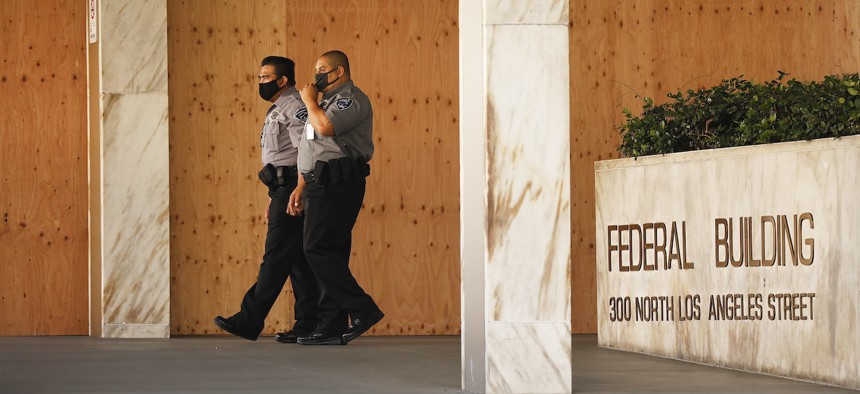
Security officers outside field offices of the U.S. Citizenship and Immigration Services in Los Angeles on July 27, 2020. Al Seib / Los Angeles Times via Getty Images
Senators unveil bipartisan bill to improve security at federal buildings
Legislation requiring agencies to respond to recommendations from the Federal Protective Service within 90 days, after a GAO investigation and congressional hearings revealed the vast majority of security recommendations go ignored.
A bipartisan pair of senators on Wednesday announced the introduction of legislation aimed at making federal agencies more responsive to recommendations to beef up security at federal buildings.
In 2022, the Homeland Security Department’s Federal Protective Service and investigators with the Government Accountability Office told members of Congress that agencies frequently ignore recommendations to improve safety at federal facilities, often due to funding constraints. Between fiscal 2017 and 2021, agencies implemented just 22% of the more than 25,000 recommendations offered by the Federal Protective Service and closed out 70% without addressing them.
These revelations were particularly concerning to lawmakers as the government confronted a wave of threats against federal employees across federal agencies. President Biden, for his part, issued an executive order last November aimed at modernizing an interagency committee tasked with evaluating and improving security at federal buildings.
At a Senate hearing shortly after the executive order’s release, DHS applauded the measure, but urged lawmakers to do more to tackle the issue.
The Improving Federal Building Security Act, introduced by Sens. Gary Peters, D-Mich., and Rick Scott, R-Fla., would require federal agencies to respond to Federal Protective Service recommendations within 90 days of their issuance. Although agencies are not required to adopt those recommendations, in instances where they reject them, they must provide a written explanation to the Homeland Security Department detailing why.
Additionally, the bill requires DHS to develop a way to monitor responses to the protective service’s recommendations, and the department must issue an annual report on agency responses to Congress.
“Federal buildings across the country serve as workplaces for federal employees and host daily visitors who come to access critical federal services,” Peters said in a statement. “As federal buildings continue to face threats, my bipartisan bill will help ensure federal agencies are following the most up-to-date security recommendations to protect both these buildings and the people in them.”
“This good legislation will make sure that when the Federal Protective Service makes safety recommendations for federal offices and buildings, they are quickly reviewed and taken into consideration,” Scott said. “Federal agencies must do everything necessary to serve the American people while keeping public servants safe.”
Peters, who serves as chairman of the Senate Homeland Security and Governmental Affairs Committee, has already scheduled a committee vote on the measure for next week.
NEXT STORY: IRS launches push to clean up its communications







